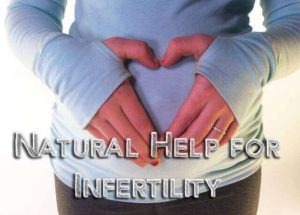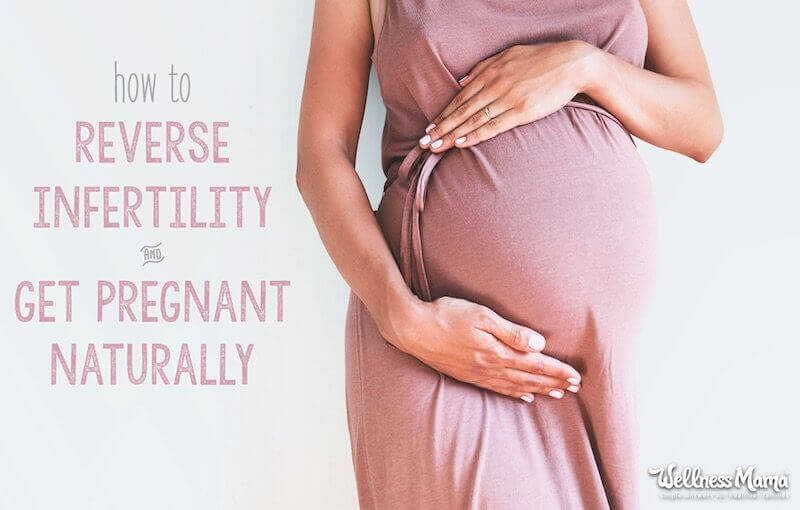There’s no doubt that infertility is a rising problem in today’s society. And while this has never been an issue for me, the CDC finds that about 10 percent of women (6.1 million) in the U.S. ages 15-44 struggle to get pregnant or stay pregnant. The reasons are many (and we don’t know all of them yet), but what we do know is that it takes a large personal and financial toll on those it affects.
(In fact, when I tried to find accurate info on how much is spent annually on infertility treatments, I kept getting results for ways to finance treatments for infertility.)
The good news is that, in many cases, the body can reverse infertility naturally if given the correct resources.
Note: It is important to check with a doctor or qualified specialist for problems like infertility and to address any potentially serious underlying health issues. Many women also benefit from working with a naturopathic doctor or specialist to address nutrition, supplements, and lifestyle changes that can help.
How Common Is Infertility, and Why Is It Rising?
According to the CDC, the term “infertile” is usually applied to a woman who is unable to become pregnant after a year of trying (or 6 months for a woman over 35).
Infertility, like any disease, is simply a sign that something is not right inside the body and must be fixed. It isn’t a deficiency in fertility drugs or due to a lack of IVF. Fertility is a natural process in the body, but one that the body can turn off if it doesn’t feel it can safely sustain a pregnancy.
I have many friends who have struggled to conceive and I’ve witnessed how painful it was for them to want to have a child and struggle to get pregnant. Thankfully, in almost every case, my friends were eventually able to conceive by focusing on supporting the body with proper diet, supplements, and lifestyle.
There are so many confounding factors that can cause or contribute to infertility, which is why conventional treatment can vary so much in effectiveness — it simply can’t address all the possible causes.
Fertility drugs and artificial hormones of any kind, including birth control, can make underlying problems better, but can also make them even worse and make future fertility more difficult. Hormonal birth control is often prescribed for various hormonal imbalances and the symptoms … but artificial hormones on top of existing hormone problems doesn’t necessarily make for success.
What Causes Infertility in the First Place?
Infertility can be caused by a huge number of factors: hormone imbalance, Polycystic Ovary Syndrome (PCOS), endometriosis, anovulatory cycles, physical blockage, inadequate hormone production, short luteal phase, lack of luteinizing hormone, high levels of prolactin, and many others.
Poor nutrition often plays a major role, as does exposure to certain chemicals. Age plays less of a role before menopause than was originally thought. While there are many wonderful naturally minded fertility specialists out there, only certain doctors know how to test for and address any of these possible underlying issues. Extreme fertility treatments do work for some, but can be very emotionally and physically exhausting, not to mention very expensive.

The great news is that dietary and lifestyle changes can make a tremendous difference in fertility, and often help with other issues like excess weight, lack of energy, blood sugar problems, skin issues, and insomnia in the process. Even those who choose to undergo conventional fertility treatments can help improve their chance of working by supporting their bodies in natural ways as well.
How to Reverse Infertility (and Get Pregnant)
This is the specific system I use when working with women on fertility, but it is also very useful for helping with PMS, cramping, fatigue, heavy periods, and other hormone-related problems. It is designed to address all issues that can contribute to infertility. Short of a physical inability to conceive, it will work.
Step 1: Nutrition
This is by far the most important step. In modern times, many people are undernourished, despite being overweight. The body simply will not allow conception to occur or a pregnancy to continue if it doesn’t have the basic foundation it needs to sustain a pregnancy.
Many women turn to a low-fat, high-fiber diet in an attempt to increase health and lose weight. Weight loss has been shown to increase fertility, but losing weight in this way is rarely effective for increasing fertility because it deprives the body of the necessary proteins and fats necessary for hormone production.
Some nutritional ways to help optimize fertility:
- Remove processed grains, other processed foods, sugars, and starches from the diet.
- Obtain more nutrient-dense carbohydrates from vegetables, some fruits, and starchy sources like sweet potatoes and squash.
- Increase healthy fats in the diet especially from sources like coconuts, coconut oil, olives and olive oil, butter, grass-fed meats, eggs, avocado, and nuts.
- Get enough protein especially from grass-fed meats, eggs, and nuts. This is also important during pregnancy as adequate protein can help minimize the risk of certain pregnancy complications.
- Eat a lot of vegetables, especially green leafy varieties like lettuce, spinach, broccoli, cauliflower, kale, collard, chard, cabbage, Brussels sprouts, and similar veggies.
- Drink enough water. Hydration is important for so many functions within the body, including fertility.
- Get insulin levels under control. Even if you don’t have Type II diabetes, a high carbohydrate diet often goes hand-in-hand with some level of insulin resistance. Optimizing dietary factors with the above methods will help make your body more sensitive to insulin, which will help production of other hormones and proper function of the body.
For some women, nutrition alone can be enough to support the body for fertility. It is very important to continue these things once pregnant and not stop giving yourself proper nutrition, which is even more vital for the growth of an unborn child.
Step 2: Lifestyle Factors
Any doctor, or even a Google search, should reveal that habits like smoking, drug use, and high caffeine intake can severely impair fertility. There are many other lifestyle factors that contribute as well:
- lack of sleep
- exposure to harmful chemicals
- lack of exercise (or too much exercise)
- high stress levels
- certain medications or supplements
Most lifestyle factors are also easy to fix with a little effort. The most common lifestyle factors that can increase fertility are:
Getting enough sleep
Sleep is vital to health and the production of many hormones. Studies have shown that women with low melatonin and serotonin levels have a shorter luteal phase (time between ovulation and menstruation) and consequently have a lower chance of conceiving. Lack of sleep also impairs the body’s ability to properly regulate adrenaline, cortisol, and insulin, making conception very difficult.
Make sleep a priority and get enough to feel rested, not just awake. This may mean taking a nap during the day or going to bed a few hours earlier. A completely dark sleep environment may also help melatonin levels and sleep.
Minimizing exposure to harmful chemicals
This should be a book in itself (hmm, time to get writing), but most women notice improvement from limiting exposure to household chemicals, plastic water bottles, and conventional cosmetic and beauty products.
Getting the right amount of exercise
Getting adequate exercise is important for fertility, but too much can have the opposite effect. Most women do well with several hours of recreational activity a week (walking, fun sports, or swimming) and a few weight training sessions. Too much moderate/intensive exercise will keep the body from ovulation if done regularly. While weight loss can greatly help fertility, having too little body fat (below 15-18%) can make the body go into an anovulatory state (not ovulate).
Limiting stress
Easier said than done, especially for anyone who is going through the emotions of fertility difficulties! You’ve probably been told that if you can relax, you will get pregnant. While this is certainly not true for everyone, reducing stress is a good idea. Often, the ideas above will help with many of the physical causes of stress, leaving you more time to (hopefully) relax.
Checking side effects of medications
Check with your doctor to see if any medications you are taking could impair fertility. Steroids and antidepressants have been known to do so, as well as any other hormone containing or affecting medications.
Step 3: Supplements & Herbs
While diet and lifestyle alone often reverse infertility, some women notice better or faster results with the aid of natural supplements and herbs.
Fish Oil
The single most important supplement that I’ve seen help women increase fertility, is adequate intake of omega-3s, which are also excellent for a developing baby and a healthy pregnancy.
Herbs
The following herbs are recommended for getting pregnant naturally:
- Red Raspberry Leaf – A well know fertility herb that is also good during pregnancy. It has a high nutrient profile and is especially high in calcium and is a uterine tonic. It is available in capsule form, but makes an excellent hot or cold tea.
- Nettle Leaf – Has a very high mineral content. It contains lots of chlorophyll and is nourishing to the adrenals and kidneys. It helps reduce stress and is a powerful uterine tonic. Once pregnant, it is great for getting enough nutrients during pregnancy and has a high vitamin K content to prevent hemorrhage. I add nettle leaf to a tea that I drink before and during pregnancy.
- Dandelion – Contains vitamins A and C as well as trace minerals. The root is beneficial to the liver and the leaf is mildly diuretic. Can help cleanse the body and remove toxins.
- Alfalfa – Has vitamins A, D, E and K and eight digestive enzymes. Contains trace minerals and vitamin K and is often added to commercial vitamins because of its high vitamin profile.
- Red Clover – Has a very high vitamin content and contains almost every trace mineral. It has been known to help balance hormones and restore fertility.
- Maca – A hormone balancing herb that is known throughout the world for its fertility and vitality promoting properties. Good for both men and women to increase fertility, though women should only take between menses and ovulation and discontinue to make sure it is not taken during pregnancy. It is a very potent herb that often has very noticeable effects on fertility. It comes in powder form or capsule form.
- Vitex/Chaste Tree Berry – Nourishes the pituitary gland and helps lengthen the luteal phase. It lowers prolactin and raises progesterone. For some women, this alone will increase fertility.
IMPORTANT: Do not take any of these herbs in combination with fertility drugs, hormone treatments, or hormonal birth control! As with any herbs, supplements, or medication, consult a doctor or health care professional about your specific case and do your own research!
Vitamins
You can’t out-supplement a poor diet, but when trying to heal a condition consider taking these:
- Vitamin D – Vitamin D deficiency is very common in America, especially during the winter, and can be very detrimental to overall health. Recent studies link inadequate vitamin D with infertility and miscarriage. Have your levels checked to find out how much you need.
- Vitamin C – A potent antioxidant, vitamin C is good for both male and female infertility. Aim for at least 2,000 mg a day pre-conception.
- Folate – Folate (not folic acid) is well known as a necessary vitamin in early pregnancy to prevent complications, but it is most beneficial when taken for several month before the pregnancy as well as during. It helps cell division and promotes ovulation. Some natural doctors recommend taking up to 5,000 micrograms a day and women hoping to get pregnant should take at least 2,000 micrograms a day. It is important to note that many people have trouble using the synthetic form, folic acid, and do better with folate or methylfolate (this post explains more).
- Zinc – Very important for cell division including sperm production and ovulation. Best when taken in combination with b-vitamins.
- Selenium – Helps protect the body from free radicals and protects sperm and egg. Known to help cell division and might prevent miscarriage.
- B-Vitamins – Deficiency of B-vitamins is common in anyone who consumes large amounts of processed foods, grains or sugars. Optimizing b vitamin levels can increase luteinizing hormone and follicle stimulating hormone to improve fertility.
Natural Progesterone Cream
Infertility struggles can often be linked to specific hormone imbalances. Especially for those with short cycles or short second phase of their cycle (ovulation through start of menses), progesterone can be the issue. I’ve seen people add only natural progesterone cream and conceive and carry a healthy pregnancy within a month or two.
When using progesterone cream, it is important to do research, work with a specialist, make sure you have a good brand that is soy-free. Only use for the second half of your cycle (ovulation through menses).
Some sources, including a midwife and a doctor I trust, suggest continuing the progesterone cream through the first three months of pregnancy and then tapering off to make sure the body has adequate progesterone to continue the pregnancy until the placenta takes over production in the second trimester. Again, do research and work with a specialist when using any hormone.
Bottom Line: Can You Get Pregnant If You Are Infertile?
Struggles with infertility can be agonizing for couples, but there is hope. Proper diet and nutrition can greatly aid the body in conceiving and carrying a healthy baby (and also are beneficial in overall health).
While sometimes medical treatment is necessary, couples should at least consider dietary changes first to support the body. The above system is also helpful for women wanting to relief from symptoms of PMS, PCOS, endometriosis, heavy periods, or other hormonal problems.
While some testing can be expensive, one option to test your fertility hormones is called Modern Fertility. They have a team of reproductive specialists who will review your test and can answer any questions you have.
More From Wellness Mama
- 474: Aimee Raupp on The Egg Quality Diet for Fertility & Healthy Pregnancy
- 709: Root Causes of Infertility, Declining Sperm Count, and How to Fix It With Dr. Nashat Latib
- 126: Dr. Marc Sklar on How to Beat Infertility and Get Pregnant Naturally
- 50: Fertility Preparation and Optimizing Pregnancy
- 17: Reversing Infertility & PCOS Naturally
- Supplements for Pregnancy & Nursing: What I Take
- How Thyroid Disease Affects Pregnancy and Fertility
- How to Reverse Infertility & Get Pregnant Naturally
This article was medically reviewed by Dr. Anna Cabeca, a gynecologist and obstetrician and a menopause and sexual health expert. As always, this is not personal medical advice and we recommend that you talk with your doctor.
Have you struggled with infertility, or know someone who does? What helps (or doesn’t help) as you search for answers?





Leave a Reply